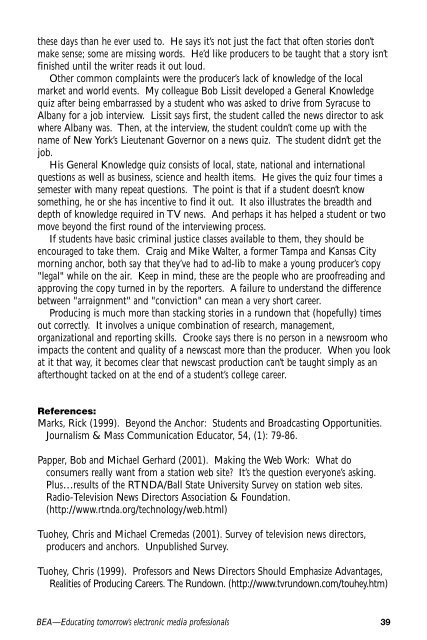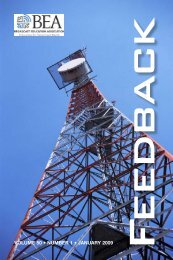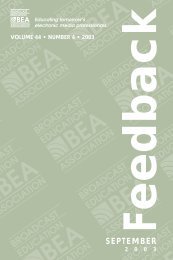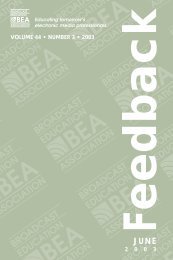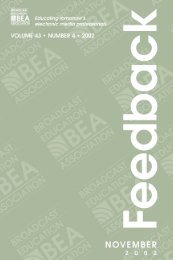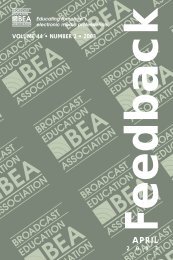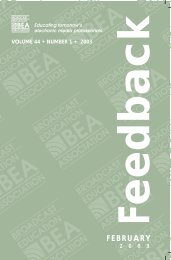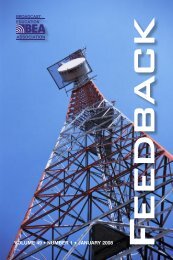these days than he ever used to. He says it’s not just the fact that often stories don’tmake sense; some are missing words. He’d like producers to be taught that a story isn’tfinished until the writer reads it out loud.Other common complaints were the producer’s lack of knowledge of the localmarket and world events. My colleague Bob Lissit developed a General Knowledgequiz after being embarrassed by a student who was asked to drive from Syracuse toAlbany for a job interview. Lissit says first, the student called the news director to askwhere Albany was. Then, at the interview, the student couldn’t come up with thename of New York’s Lieutenant Governor on a news quiz. The student didn’t get thejob.His General Knowledge quiz consists of local, state, national and internationalquestions as well as business, science and health items. He gives the quiz four times asemester with many repeat questions. The point is that if a student doesn’t knowsomething, he or she has incentive to find it out. It also illustrates the breadth anddepth of knowledge required in TV news. And perhaps it has helped a student or twomove beyond the first round of the interviewing process.If students have basic criminal justice classes available to them, they should beencouraged to take them. Craig and Mike Walter, a former Tampa and Kansas Citymorning anchor, both say that they’ve had to ad-lib to make a young producer’s copy"legal" while on the air. Keep in mind, these are the people who are proofreading andapproving the copy turned in by the reporters. A failure to understand the differencebetween "arraignment" and "conviction" can mean a very short career.Producing is much more than stacking stories in a rundown that (hopefully) timesout correctly. It involves a unique combination of research, management,organizational and reporting skills. Crooke says there is no person in a newsroom whoimpacts the content and quality of a newscast more than the producer. When you lookat it that way, it becomes clear that newscast production can’t be taught simply as anafterthought tacked on at the end of a student’s college career.References:Marks, Rick (1999). Beyond the Anchor: Students and Broadcasting Opportunities.Journalism & Mass Communication Educator, 54, (1): 79-86.Papper, Bob and Michael Gerhard (2001). Making the Web Work: What doconsumers really want from a station web site? It’s the question everyone’s asking.Plus…results of the RTNDA/Ball State University Survey on station web sites.Radio-Television News Directors Association & Foundation.(http://www.rtnda.org/technology/web.html)Tuohey, Chris and Michael Cremedas (2001). Survey of television news directors,producers and anchors. Unpublished Survey.Tuohey, Chris (1999). Professors and News Directors Should Emphasize Advantages,Realities of Producing Careers. The Rundown. (http://www.tvrundown.com/touhey.htm)BEA—Educating tomorrow’s electronic media professionals 39
PAUSETHE LIFE CYCLE OF AN ADMINISTRATOROR TALES FROM THE DARKSIDETom Bohn, Ithaca Collegebohn@ithaca.eduFor many Chairs, Deans, and other assorted administrators of communicationprograms, there is no life cycle; their time in office is temporary at best — the “keepthe seat warm” position. They are there under duress and can’t wait to have their armand head back in their natural positions.However, for others, “administrator” is not another word for S.O.B. and theyactually aspire to the position, perspire in the position, and inspire with the position.They see administration as a career and a choice — perhaps not lifetime — but,certainly, a decision that involves thought and action, rather than simply drawing theshort straw.In a panel presentation at the <strong>2002</strong> BEA Convention on administrative lifestyles, weheard a number of stories from the front lines: tales of “getting started,” “settling in,”“cruising along,” and, in my presentation, “winding down.”First a disclaimer: despite the occasional prayer and possibly petition or two, I amnot returning to full-time teaching; but, if and when I do, I hope to follow theprinciples developed in this presentation. Usually when asked about stepping down orretiring, I indicate that I have a four-year plan and a six-week attitude.When is it time to return to full-time teaching from administration; especially whenit involves, once again, choice, fueled by thought and action, rather than the result of a“conversation” with the Dean or Provost or the dreaded NCV — “no confidence vote.”What are the warning signs or signals that it is time to really find the bottom of yourdesk, delete the “list serve memo-maker” function on your computer, and throw awaythe remaining 10,000 business cards you had made up five years ago?Signs of the Time(1) You think a five-day-a-week teaching schedule is “load relief.”(2) You think an 8am class is an opportunity to sleep in.(3) You think student complaints about faculty would be welcome relief fromfaculty complaints about students — or — is it the other way around?(4) You actually want to read the Journal of Broadcasting and Electronic Media,Journalism Quarterly and the Journal of Radio Studies rather than having yourDepartment Assistant stamp “circulate” on the cover before it even gets to youroffice.(5) You want to go to BEA to listen rather than recruit — or, worse yet — to givepapers on administrative lifestyles.(6) You never want to buy a suit again.Ultimately, the signs are individual and even idiosyncratic. Sometimes, there is the40<strong>Feedback</strong> <strong>May</strong> <strong>2002</strong> (<strong>Vol</strong>. <strong>43</strong>, <strong>No</strong>. 2)
- Page 1 and 2: Feedback May 2002 (Vol. 43, No. 2)F
- Page 3 and 4: EditReviews . . . . . . . . . . . .
- Page 5 and 6: Examples of student projects:• Pl
- Page 7 and 8: These teachers will also offer a nu
- Page 9 and 10: The whole project forum will meet t
- Page 11 and 12: An e-mail from a recent graduate wh
- Page 13 and 14: or grip contributes to the overall
- Page 15 and 16: Because much of the satisfaction in
- Page 17 and 18: RECORDMANAGEMENT: AN MBTI CASE STUD
- Page 19 and 20: $500 savings on his car purchase. E
- Page 21 and 22: is the largest and most comprehensi
- Page 23 and 24: The PR major at Central Michigan Un
- Page 25 and 26: FAST FORWARDTHE CONVERGENCE CURRICU
- Page 27 and 28: how to shoot video for our newspape
- Page 29 and 30: it meant overseeing radio commercia
- Page 31 and 32: RECORDTHE PARTICIPATION OF WOMENIN
- Page 33 and 34: On the programming front, in early
- Page 35 and 36: Of these 553 participants, 438 (79.
- Page 37 and 38: Table 4: Percentage of female membe
- Page 39 and 40: Kennard, W.E. (1998, September 29).
- Page 41: RECORDSOLVING THE “PRODUCER PROBL
- Page 45 and 46: decision to return to full-time tea
- Page 47 and 48: SEARCHBEA Interest Division Chairs
- Page 49 and 50: SEARCH2002-2003 Leadership Listing
- Page 51 and 52: DISTRICT 7 — All two-year schools
- Page 53 and 54: SEARCHBEA 2002-2003 SCHOLARSHIP WIN
- Page 55 and 56: SEARCHBEA STUDENT NEWS AWARDSby Dan
- Page 57 and 58: Table 3Broadcast Education Associat
- Page 59 and 60: EDITMcLean, Donald F. (2000). Resto
- Page 61 and 62: EDITBeale, M. E., & Murray, M. D. (
- Page 63 and 64: EDITGokhale, Anu. Introduction to T
- Page 65: EDITKeller, Teresa & Hawkins, Steph


